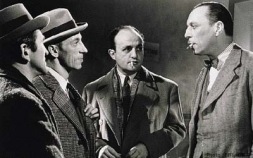![[Deep Focus]](../../flicker/longo.gif)

Not quite noir.
![[Deep Focus]](../../flicker/longo.gif)
|
|
| Quai des Orfèvres
|
|

|
A |
Not quite noir. |
|
|
Movie Credits: Directed by Henri-Georges Clouzot Written by Jean Ferry and Clouzot from a novel by Stanislas-Andreé Steeman Cinematography by Armand Thirard Edited by Charles Bretoneiche Starring Suzy Delair, Bernard Blier, Louis Jouvet and Simone Renant France, 1947 Aspect ratio: 1.33:1 Screened at Film Forum, New York, NY |
This 1947 drama from Les Diaboliques director Henri-Georges Clouzot is a splendid find - part policier and part marital comedy, replete with that winking, twisting sexuality that the French have always done so well. Among the dramatis personae are Maurice, a middle-aged songwriter who lives in perpetual dread that he's about to be cuckolded by his lovely and voluptuous wife, stage name Jenny Lamour, who shakes her tra-la-la to the delight of theater patrons and dirty old men alike. A dirty old man is, in fact, involved, as well as a lovesick photographer named Dora, who carries her own torch for Jenny. Halfway through, a policeman (the great Louis Jouvet) shows up to investigate a murder that Maurice, Jenny and Dora have, wittingly and/or unwittingly, gotten themselves mixed up in. The ensuing investigation takes place mostly in conversation, with the hapless Maurice trying to extricate himself from underneath a heap of circumstantial evidence and the cunning interrogator Antoine parsing every word he says carefully in an effort to implicate him. But more striking than the specifics of the thriller plotline is the atmosphere of the piece, with Paris making a lovely backdrop, photographed in wonderful, glowing tones with a chiaroscuro lighting scheme doubtless informed by American film noir. The restored print that showed earlier this year at Film Forum is marvelous, yielding up scalding whites and thick blacks that hint more at the passions involved - and the threat posed to the working man by the police - than to the surprisingly benign character motivations. In keeping with Clouzot's body of work, the subtext has to do with the lot of the working class. Jenny nearly prostitutes herself in a bid to get a film role, and the police are seen circling, like vultures, over the heads of those without the money to buy their way out of trouble. The twist is that, despite the hard-boiled title (which refers to the address of Parisian police headquarters) and Clouzot's reputation as an unsparing observer of human vices, Quai des Orfèvres is nowhere near as noir as you might expect. In one playful shot, the tension underscoring an argument between Margeurite and Maurice is ratcheted up by the furious see-sawing of a violin on the soundtrack - at least until you notice the violinist himself advancing on the couple from the band rehearsing behind them. It's the humor alongside the dread - the musical numbers and the sexual tease, including a whiff of lesbianism - that makes Quai des Orfèvres a highly entertaining exercise in pulp cinema. More, it boasts splendid performances and a full-throated expressionistic style. And, against the odds, it has that rarest of all noir attributes - a happy ending. |
 http://www.deep-focus.com/dfweblog/
bryant@deep-focus.com
http://www.deep-focus.com/dfweblog/
bryant@deep-focus.com